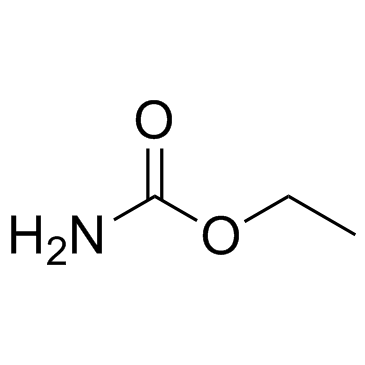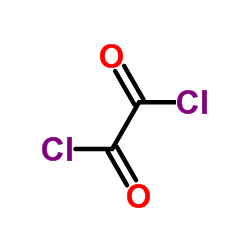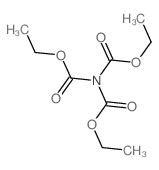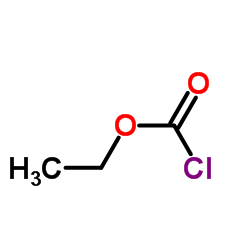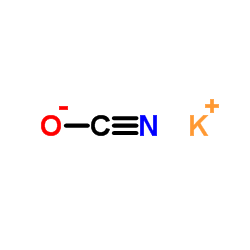19617-43-7
| 中文名 | 乙氧基羰酰异氰酸酯 |
|---|---|
| 英文名 | ethyl N-(oxomethylidene)carbamate |
| 中文别名 | 异氰酸基甲酸乙酯 |
| 英文别名 |
carboisocyanatidic acid ethyl ester
N-ethoxycarbonyl isocyanate Ethoxycarbonyl isocyanate N-(oxo-methylene)-carbamic acid ethyl ester ethoxycarbonylisocyanate acetyl thioisocynate ethyl isocyanatooate MFCD00011719 Ethyl isocyanatoformate Carbonisocyanatidic acid, ethyl ester Ethyl carbonisocyanatidate |
| 密度 | 1.1±0.1 g/cm3 |
|---|---|
| 沸点 | 129.3±9.0 °C at 760 mmHg |
| 分子式 | C4H5NO3 |
| 分子量 | 115.087 |
| 闪点 | 35.6±0.0 °C |
| 精确质量 | 115.026939 |
| PSA | 55.73000 |
| LogP | 1.43 |
| 外观性状 | Liquid | Clear colorless |
| 蒸汽压 | 10.2±0.2 mmHg at 25°C |
| 折射率 | 1.444 |
| 储存条件 | Flammables area |
| 分子结构 | 1、 摩尔折射率:26.93 2、 摩尔体积(m3/mol):101.4 3、 等张比容(90.2K):251.5 4、 表面张力(dyne/cm):37.7 5、 极化率(10-24cm3):10.67 |
| 计算化学 | 1.疏水参数计算参考值(XlogP):1.7 2.氢键供体数量:0 3.氢键受体数量:3 4.可旋转化学键数量:2 5.互变异构体数量:无 6.拓扑分子极性表面积55.7 7.重原子数量:8 8.表面电荷:0 9.复杂度:125 10.同位素原子数量:0 11.确定原子立构中心数量:0 12.不确定原子立构中心数量:0 13.确定化学键立构中心数量:0 14.不确定化学键立构中心数量:0 15.共价键单元数量:1 |
| 更多 | 1. 性状:无可用 2. 密度(g/mL,25/4℃):1.115 3. 相对蒸汽密度(g/mL,空气=1):无可用 4. 熔点(ºC):无可用 5. 沸点(ºC,常压):25/10 mmHg 6. 沸点(ºC,5.2kPa):无可用 7. 折射率:1.408 8. 闪点(ºC):无可用 9. 比旋光度(º):无可用 10. 自燃点或引燃温度(ºC):无可用 11. 蒸气压(kPa,25ºC):无可用 12. 饱和蒸气压(kPa,60ºC):无可用 13. 燃烧热(KJ/mol):无可用 14. 临界温度(ºC):无可用 15. 临界压力(KPa):无可用 16. 油水(辛醇/水)分配系数的对数值:无可用 17. 爆炸上限(%,V/V):无可用 18. 爆炸下限(%,V/V):无可用 19. 溶解性:无可用 |
Synonym:None Section 2 - COMPOSITION, INFORMATION ON INGREDIENTS
Risk Phrases: 10 Section 3 - HAZARDS IDENTIFICATION EMERGENCY OVERVIEW
Flammable.Moisture sensitive. Potential Health Effects Eye: May cause eye irritation. The toxicological properties of this material have not been fully investigated. Skin: May cause skin irritation. The toxicological properties of this material have not been fully investigated. Ingestion: May cause gastrointestinal irritation with nausea, vomiting and diarrhea. Contains cyanide. May cause dizziness, tremors, restlessness, rapid heart beat, increased blood pressure, hallucinations, kidney failure, and pulmonary edema. Inhalation: May cause respiratory tract irritation. Vapors may cause dizziness or suffocation. Inhalation of high concentrations may cause pulmonary edema. May cause cardiac abnormalities. Contains cyanide. Chronic: Chronic inhalation and ingestion may cause effects similar to those of acute inhalation and ingestion. Section 4 - FIRST AID MEASURES Eyes: Flush eyes with plenty of water for at least 15 minutes, occasionally lifting the upper and lower eyelids. Get medical aid immediately. Skin: Get medical aid. Flush skin with plenty of water for at least 15 minutes while removing contaminated clothing and shoes. Wash clothing before reuse. Ingestion: Never give anything by mouth to an unconscious person. Get medical aid immediately. Do NOT induce vomiting. If conscious and alert, rinse mouth and drink 2-4 cupfuls of milk or water. Inhalation: Remove from exposure and move to fresh air immediately. If not breathing, give artificial respiration. If breathing is difficult, give oxygen. Get medical aid. Notes to Physician: Exposure should be treated as a cyanide poisoning. Antidote: Always have a cyanide antidote kit on hand when working with cyanide compounds. Get medical advice to use. Section 5 - FIRE FIGHTING MEASURES General Information: As in any fire, wear a self-contained breathing apparatus in pressure-demand, MSHA/NIOSH (approved or equivalent), and full protective gear. Vapors may form an explosive mixture with air. During a fire, irritating and highly toxic gases may be generated by thermal decomposition or combustion. Will burn if involved in a fire. Use water spray to keep fire-exposed containers cool. Containers may explode in the heat of a fire. Flammable liquid and vapor. Extinguishing Media: For small fires, use dry chemical, carbon dioxide, water spray or alcohol-resistant foam. For large fires, use water spray, fog, or alcohol-resistant foam. Use water spray to cool fire-exposed containers. Water may be ineffective. Do NOT use straight streams of water. Section 6 - ACCIDENTAL RELEASE MEASURES General Information: Use proper personal protective equipment as indicated in Section 8. Spills/Leaks: Absorb spill with inert material (e.g. vermiculite, sand or earth), then place in suitable container. Clean up spills immediately, observing precautions in the Protective Equipment section. Remove all sources of ignition. Use a spark-proof tool. Provide ventilation. A vapor suppressing foam may be used to reduce vapors. Section 7 - HANDLING and STORAGE Handling: Wash thoroughly after handling. Use with adequate ventilation. Ground and bond containers when transferring material. Use spark-proof tools and explosion proof equipment. Avoid breathing dust, vapor, mist, or gas. Avoid contact with skin and eyes. Empty containers retain product residue, (liquid and/or vapor), and can be dangerous. Keep container tightly closed. Keep away from heat, sparks and flame. Do not pressurize, cut, weld, braze, solder, drill, grind, or expose empty containers to heat, sparks or open flames. Storage: Keep away from heat, sparks, and flame. Keep away from sources of ignition. Store in a tightly closed container. Keep under a nitrogen blanket. Store in a cool, dry, well-ventilated area away from incompatible substances. Flammables-area. Section 8 - EXPOSURE CONTROLS, PERSONAL PROTECTION Engineering Controls: Use adequate ventilation to keep airborne concentrations low. Exposure Limits CAS# 19617-43-7: Personal Protective Equipment Eyes: Wear appropriate protective eyeglasses or chemical safety goggles as described by OSHA's eye and face protection regulations in 29 CFR 1910.133 or European Standard EN166. Skin: Wear appropriate protective gloves to prevent skin exposure. Clothing: Wear appropriate protective clothing to prevent skin exposure. Respirators: Follow the OSHA respirator regulations found in 29 CFR 1910.134 or European Standard EN 149. Use a NIOSH/MSHA or European Standard EN 149 approved respirator if exposure limits are exceeded or if irritation or other symptoms are experienced. Section 9 - PHYSICAL AND CHEMICAL PROPERTIES Physical State: Liquid Color: clear, colorless Odor: Not available. pH: Not available. Vapor Pressure: Not available. Viscosity: Not available. Boiling Point: 25 deg C @ 10.00mm Freezing/Melting Point: Not available. Autoignition Temperature: Not available. Flash Point: 35 deg C ( 95.00 deg F) Explosion Limits, lower: N/A Explosion Limits, upper: N/A Decomposition Temperature: Solubility in water: Specific Gravity/Density: 1.1150g/cm3 Molecular Formula: C2H5O2NCO Molecular Weight: 115.09 Section 10 - STABILITY AND REACTIVITY Chemical Stability: Stable at room temperature in closed containers under normal storage and handling conditions. Conditions to Avoid: Incompatible materials, ignition sources, excess heat, exposure to moist air or water. Incompatibilities with Other Materials: Oxidizing agents. Hazardous Decomposition Products: Nitrogen oxides, carbon monoxide, irritating and toxic fumes and gases, carbon dioxide. Hazardous Polymerization: Has not been reported Section 11 - TOXICOLOGICAL INFORMATION RTECS#: CAS# 19617-43-7 unlisted. LD50/LC50: Not available. Carcinogenicity: Ethoxycarbonyl Isocyanate - Not listed by ACGIH, IARC, or NTP. Section 12 - ECOLOGICAL INFORMATION Section 13 - DISPOSAL CONSIDERATIONS Dispose of in a manner consistent with federal, state, and local regulations. Section 14 - TRANSPORT INFORMATION IATA Shipping Name: ISOCYANATES, TOXIC, FLAMMABLE, N.O.S.* Hazard Class: 6.1 (3) UN Number: 3080 Packing Group: II IMO Shipping Name: ISOCYANATES, TOXIC, FLAMMABLE, N.O.S. Hazard Class: 6.1 (3) UN Number: 3080 Packing Group: II RID/ADR Shipping Name: ISOCYANATES, TOXIC, FLAMMABLE, N.O.S. Hazard Class: 6.1 (3) UN Number: 3080 Packing group: II Section 15 - REGULATORY INFORMATION European/International Regulations European Labeling in Accordance with EC Directives Hazard Symbols: Not available. Risk Phrases: R 10 Flammable. Safety Phrases: S 9 Keep container in a well-ventilated place. S 16 Keep away from sources of ignition - No smoking. S 26 In case of contact with eyes, rinse immediately with plenty of water and seek medical advice. S 28A After contact with skin, wash immediately with plenty of water. S 33 Take precautionary measures against static discharges. S 36/37/39 Wear suitable protective clothing, gloves and eye/face protection. S 37 Wear suitable gloves. S 45 In case of accident or if you feel unwell, seek medical advice immediately (show the label where possible). WGK (Water Danger/Protection) CAS# 19617-43-7: No information available. Canada None of the chemicals in this product are listed on the DSL/NDSL list. CAS# 19617-43-7 is not listed on Canada's Ingredient Disclosure List. US FEDERAL TSCA CAS# 19617-43-7 is not listed on the TSCA inventory. It is for research and development use only. SECTION 16 - ADDITIONAL INFORMATION N/A |
|
生态学数据: 该物质对环境可能有危害,对水体应给予特别注意。
|
| 符号 |


GHS02, GHS07 |
|---|---|
| 信号词 | Warning |
| 危害声明 | H226-H302 + H312 + H332-H315-H319-H335 |
| 警示性声明 | P261-P280-P305 + P351 + P338 |
| 个人防护装备 | Eyeshields;Faceshields;full-face respirator (US);Gloves;multi-purpose combination respirator cartridge (US);type ABEK (EN14387) respirator filter |
| 危害码 (欧洲) | Xn |
| 风险声明 (欧洲) | R10 |
| 安全声明 (欧洲) | S7 |
| 危险品运输编码 | UN 3080 6.1/PG 2 |
| WGK德国 | 3 |
| 包装等级 | II |
| 危险类别 | 6.1(a) |
| 海关编码 | 2929109000 |
|
~% 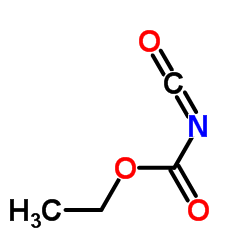
19617-43-7 |
| 文献:Angewandte Chemie - International Edition, , vol. 46, # 32 p. 6123 - 6125 |
|
~% 
19617-43-7 |
| 文献:Journal of Heterocyclic Chemistry, , vol. 6, p. 261 - 264 |
|
~% 
19617-43-7 |
| 文献:Chemische Berichte, , vol. 39, p. 696 |
|
~% 
19617-43-7 |
| 文献:Bulletin of the Chemical Society of Japan, , vol. 67, # 10 p. 2838 - 2849 |
|
~% 
19617-43-7
详细
|
| 文献:Chemische Berichte, , vol. 39, p. 696 |
|
~% 
19617-43-7 |
| 文献:Chemische Berichte, , vol. 41, p. 2396 |
|
~% 
19617-43-7 |
| 文献:Chemische Berichte, , vol. 44, p. 3164 |
| 海关编码 | 2929109000 |
|---|---|
| 中文概述 | 2929109000. 其他异氰酸酯. 增值税率:17.0%. 退税率:13.0%. 监管条件:无. 最惠国关税:6.5%. 普通关税:30.0% |
| 申报要素 | 品名, 成分含量, 用途 |
| Summary | 2929109000. other isocyanates. VAT:17.0%. Tax rebate rate:13.0%. . MFN tariff:6.5%. General tariff:30.0% |


